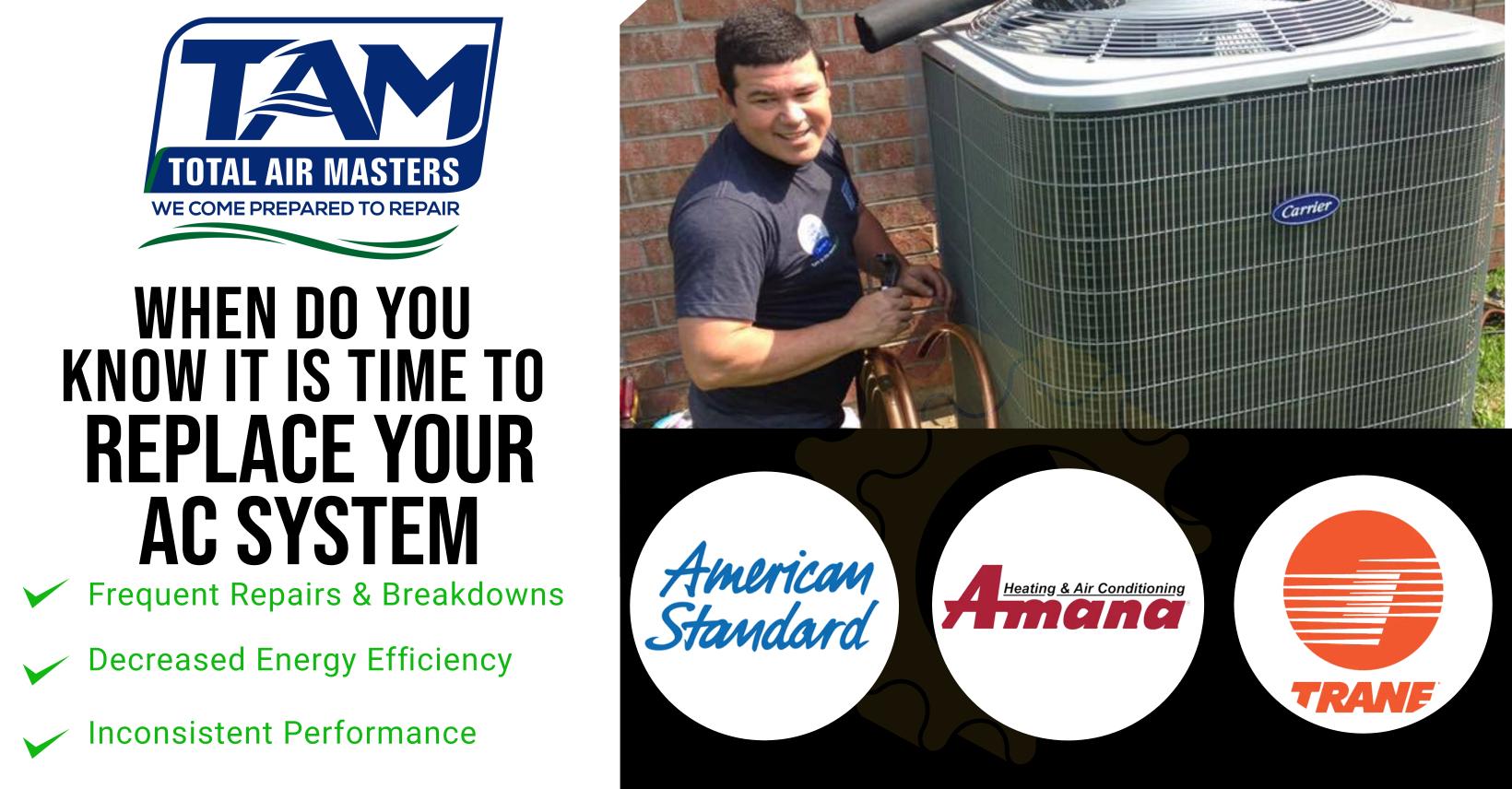
Knowing when it’s time to replace your air conditioning system can be essential for maintaining a comfortable and energy-efficient home. Unfortunately, recognizing the signs that indicate a need for AC replacement can be challenging, especially for homeowners who are not familiar with their system’s intricacies. However, it’s crucial to make informed decisions about your AC system to avoid unexpected breakdowns and ensure optimal performance. In this comprehensive guide, we will explore key indicators that signal when it’s time to replace your AC unit, as well as suggestions for making the replacement process as smooth and stress-free as possible.
At Total Air Masters, we’re committed to helping you make the right decisions for your home’s comfort and efficiency. As your local AC company, we’re here to provide expert advice and guidance on how to identify and address the signs that it’s time to replace your AC system. Read on to learn about essential factors to consider when determining if your air conditioner has reached the end of its lifespan and how to choose the right replacement unit for your needs.
Signs That It’s Time to Replace Your AC System
Age of Your AC System
The first factor to consider when deciding whether it’s time to replace your air conditioning system is its age. Most AC units have a lifespan of 10 to 15 years. As your system approaches this age range, it becomes more likely to experience issues, decreased efficiency, and potential breakdowns. If your AC system is well-maintained, it may last longer, but if it has not been adequately maintained or has already shown signs of wear and tear, it could be time to start considering a replacement.
Frequent Repairs and Breakdowns
As AC systems age, they will likely require more repairs and may experience more frequent breakdowns. If your AC unit has needed several repairs or experienced multiple breakdowns in recent years, it may be more cost-effective to replace the system instead of continuing to invest in maintenance and repairs. An HVAC professional can help you assess your system’s overall condition and evaluate whether it’s more practical to repair or replace the unit.
Decreased Energy Efficiency
Another sign that it could be time to replace your AC system is a noticeable decrease in energy efficiency. Older, less efficient AC systems can lead to increased energy consumption, resulting in higher utility bills. Upgrading to a more energy-efficient model can lead to significant cost savings and better system performance. You can evaluate your system’s current energy efficiency by reviewing your energy bills, checking the Seasonal Energy Efficiency Ratio (SEER) rating of your unit, and noting any changes in your home’s overall comfort.
Inconsistent Performance
If your air conditioning system struggles to maintain consistent temperatures throughout your home or has difficulty cooling your living space effectively, it may be an indication that your system is nearing the end of its lifespan. These performance issues may be the result of worn components, poor system sizing, or a lack of proper maintenance. An HVAC professional can help determine the cause of the problem and recommend whether a repair, upgrade, or replacement is the best solution.
Choosing the Right AC Replacement Option
When it comes to replacing your AC system, there are several factors to consider when selecting the most appropriate option for your home:
Proper System Sizing
Choosing the right size AC unit for your living space is crucial for optimal performance and energy efficiency. An improperly sized system can result in increased energy consumption, uneven temperature control, and a shortened lifespan. Consult with an HVAC professional to determine the appropriate size and type of air conditioner for your home based on factors such as square footage, insulation, and climate.
Energy Efficiency Ratings
When comparing AC units, it’s essential to pay attention to their SEER ratings. A higher SEER rating indicates a more energy-efficient system, often leading to lower energy bills, and a reduced environmental impact. Look for models with an Energy Star certification, as these units have met stringent energy efficiency guidelines set by the Environmental Protection Agency (EPA).
Advanced Features and Technologies
Modern AC systems offer an array of advanced features and technologies designed to improve performance, efficiency, and user convenience. Some features to consider when choosing an AC replacement include:
1. Variable Speed Compressors: These compressors can adjust their speed to accommodate the cooling demands of your home more accurately, resulting in greater energy efficiency and a more consistent indoor temperature.
2. Smart Thermostats: Smart thermostats allow for more precise temperature control, scheduling, and even remote access to optimize your AC system’s energy usage.
3. Quiet Operation Modes: Many newer AC units are designed to operate more quietly, reducing noise pollution and improving overall comfort.
Professional Guidance and Support
When selecting the best replacement option for your AC system, it’s crucial to consult with a trusted HVAC professional. They can assess your specific needs and guide you toward the best unit based on your unique requirements, including budget, home layout, climate, and energy efficiency preferences.
Preparing for the AC Replacement Process
Once you’ve decided that it’s time to replace your air conditioning system, proper preparation can help ensure a smooth installation and optimal performance from your new unit:
1. Schedule a Professional Assessment: Before purchasing a new AC unit, arrange for an HVAC professional to assess your home and recommend the appropriate system size and model.
2. Address Ductwork and Insulation Improvements: Ensure that your home’s ductwork and insulation are in good condition before installing a new AC system to optimize its performance and efficiency.
3. Plan in Advance: Scheduling your AC replacement during the offseason can often save you money and minimize disruption, as technicians may have more availability and flexibility.
4. Choose a Reputable Installer: Work with a trusted, experienced AC installation professional to ensure that your new system is installed correctly and operates at peak efficiency from the start.
Trust the Experts for Your AC Replacement Needs
Recognizing when it’s time to replace your AC system is crucial for maintaining comfort, energy efficiency, and reliability within your home. When faced with the decision to repair or replace your system, it’s essential to consider the age, efficiency, and overall performance of your current AC unit. By consulting with experienced HVAC professionals and investing in the appropriate replacement option, you can ensure long-term savings and satisfaction.
At Total Air Masters, we understand the importance of making informed decisions about your air conditioning system. As your local AC company, we’re here to provide HVAC services as smoothly as possible. Contact us today to schedule your AC replacement in Cypress and beyond, and let our experts help guide you through the process, ensuring optimal comfort and energy efficiency for your home.
